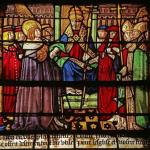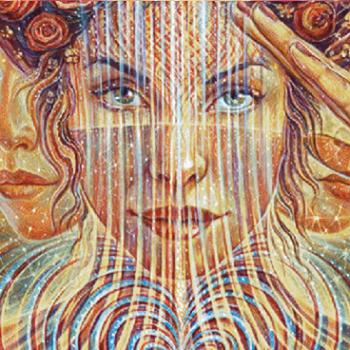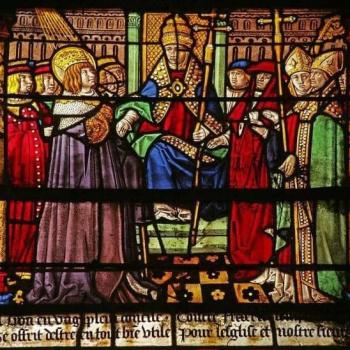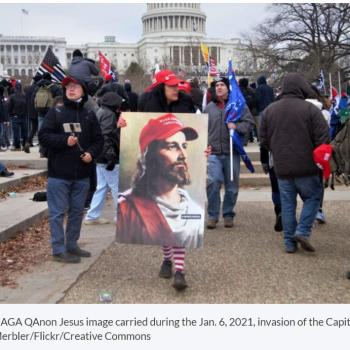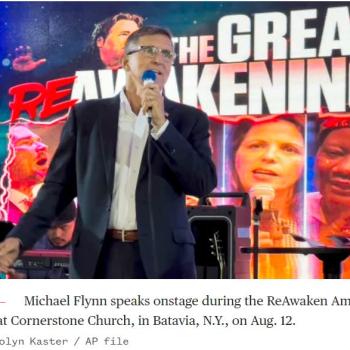What do you suppose would happen if you brought a diverse group of people together who don’t share the same religious beliefs to talk about their faith (or lack thereof)? Conventional wisdom says this is a recipe for strife, anger and division. Christians, progressive Christians, theists, non-theists, atheists and gay, straight, trans and ethnically diverse people walk into a church….and according to the religious right, all mayhem should break loose. Right?
It didn’t. I was there.
AWAKEN NASHVILLE 2023
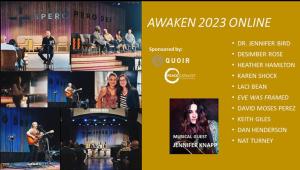
I was privileged to attend an event in June called Awaken Nashville. The only requirement for attending was to put humanity ahead of beliefs and listening ahead of being right. The result was a beautiful symphony of the most loving and interesting people I’ve met in a long time. More on that in a moment.
The event was sponsored by several groups including Quoir Publishing, which has published my book, Confessions of a Recovering Evangelical. It was published in October 2022. Also, Spero Dei church in Nashville was brave enough to host this radical event.
Keith Giles, one of the co-owners of the Quoir publishing company, was the host and mastermind of the event. He has this crazy vision that people of very disparate beliefs can come together to share their stories and find love and acceptance without the need for agreement on a prior set of beliefs. Radical isn’t it?
THEOLOGICAL UNIFORMITY NOT REQUIRED
Most American Evangelical Christians posit that to have “fellowship” with others, you must have a common set of beliefs to rally behind. Call it a creed, doctrine, dogma, or statement faith; these beliefs become of the sine qua non of a church or denomination. Any church I ever attended required a signed document stating such agreement.
What is the result? Well, there are literally thousands of denominations throughout the Christian religion most of them ready to disassociate with you if you don’t accept their creed. In other words, “connecting” with them is preconditioned on believing like them.
Belief trumps love.
CONFESSIONS OF A RECOVERING EVANGELICAL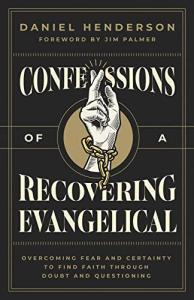
One of the major premises of my book is that the Christian religion defines “faith” as a set of beliefs. These beliefs of course are all labeled as “biblical.” Each of the thousands of denominations believe their doctrine is more biblical than the next. So, agreement with these so-called biblical beliefs is the basis for people coming together to worship God.
In my own life I came to challenge this presupposition because I had seen the destructive and hurtful way it is used. I redefined faith as embracing and accepting doubts about religious beliefs and seeking connections with others based on our common humanity, not an external set of ideas. I have found this shift in definition to be very revolutionary, refreshing and liberating.
But I have wondered if this redefinition could stand up to the scrutiny of experience. It has worked out for me in so many individual circumstances and with individual people, but can a group of people really use their doubts and questions as a basis to find a connection with each other?
I found out they can!
COMMUNITY THROUGH STORYTELLING
Awaken Nashville was a two-day event that brought together a very diverse and unique group of people who may have had only one thing in common… all questioned and doubted the conventional religious doctrine that they were raised with and have moved beyond it. No two individuals at this conference probably had identical beliefs, but that wasn’t the prerequisite for inclusion.
In some way, this event was an experiment for me to see if what I had concluded and wrote about had substance and gravitas. Could it be true that people don’t have to have the same beliefs to share a loving space? I knew the destructive nature of forced cognitive compliance, but could this provide an alternative?
Here is what I discovered.
Each speaker was unique, had diverse views and opinions, but the most important characteristic of the event was the storytelling. It was powerful and unifying. Regardless of the intellectual idea, the stories told spoke to the core of our beings and we drew together around shared experiences.
Storytelling was the major communication format. Each person told their own unique story and there was never any compulsion or requirement for others to think or feel the same way. We all just sat and listened, accepted and loved each person that shared their personal experience. Cognitive agreement was not required.
DR. JENNIFER BIRD
The first speaker of the conference was Dr. Jennifer Bird whose presentation title was “Why You Don’t Want to have Biblical Marriage.” I knew right then I was in the right place. Her biblical scholarship combined with her straightforward honesty and the sharing of her own story sprinkled throughout was compelling, inspiring and controversial…but that was the point. She questioned the traditional Christian theology of marriage by pointing out many of the contradictions within that theology. Perhaps the most compelling argument she made was why evangelical Christians try to define “true biblical marriage” from two men (Paul & Jesus) who were never married or had children? She was delightful.
HEATHER HAMILTON
Next came Heather Hamilton whose new book Returning to Eden has made a huge splash and is getting attention nationally. Heather shared her story of how she towed the evangelical line for most of her life, until she crashed and burned under the pressure and weight of expectations. She relates that during a moment of panic and anxiety it was a trans-woman that ministered to her in a way she never expected. It changed her whole paradigm and she began to see Biblical stories in a transcendent way…as mythology designed to help us connect to the deepest part of our o
wn being or our true self. Although she rejects evangelical orthodoxy, she re-visions the Bible in a way that is life-giving and inspiring. No need to ditch the Bible.
LACI BEAN
The first evening was finished off by Laci Bean, who had the most beautiful purple hair. I was so impressed with the ease in which she told us of her sexual orientation, and that she had only recently left the evangelical fold. She has a very strong following on Tik Tok and works as a religious trauma counselor. She was authentic, honest, loving and inviting. She just sort of oozed with love for those around her. She even made a shout out to the “older ones” that were in the conference, a group I identified with. It was a cross-generational group and she loved and was encouraged to see and hear from those of us with a few more miles on our wheels.
The next morning, I kicked off the day off with a presentation on “Antiracism as a Spiritual Practice.” The response was wonderful, and I was especially appreciative of the feedback I got from my new friend Desimber Rose. Desimber was at one time a Baptist pastor. She was very affirming of the approach to antiracism that I took. She wrote to me on another post and said, “Thank you for being a Genuine Ally and Advocate for Equality. I really enjoyed your presentation and I’m blessed to call you friend!!” That meant a lot to me coming from her. More about Desimber in a moment.
JIM PALMER
Next came Jim Palmer. Jim is from Nashville and is the director of the Center for Non-Religious Spirituality. After having spent part of his career as a megachurch pastor, he finally reached a crisis point and walked away from it. It is a very similar story to my own, so much so, that Jim wrote the foreword to my book a year ago. Jim and I have traveled very similar paths and he is now helping hundreds of people work through religious trauma. Jim encouraged us to continue to evolve and grow and think about spirituality in a deeper way, beyond just the “commodification” of the word. Jim is one of those guys that is never “done” with life. He is planning a hike on the Appalachian trail with his daughter, and the lesson he has learned about hiking is to “hike your own hike.” You can apply this in your faith-spiritual life very easily. Thanks Jim.
KAREN SHOCK
Then there was Karen Shock. I was particularly struck by her story. She started out her presentation with a great deal of transparency. She admitted this was the first audience that she has spoken to that included men. What? Karen was raised in the Bill Gothard, authority umbrella bullshit. (Sorry for the colorful adjective, but that’s what it is). In her new book, Too Much and Not Enough, Karen writes with refreshing brutal honesty about her experiences growing up under the influence of toxic theological systems that left her doubting her sanity, her identity, and her voice. Her story was both sad and joyful. If you have watched the recent documentary, Shiny Happy People, you will understand the wrenching experience that Karen went through, and survived, but now is thriving. She was so brave to speak to a group that included men…and we loved her through the experience.
EVE_WASFRAMED
There was one (maybe more) atheist speakers. Eve_wasframed, was raised in a well-known evangelical family. I love her self-chosen name by the way. Eve is always made out to be the “villain” in the creation story, but…but, what if she were set up and framed, by God? Maybe she is the hero of the story for having the audacity to seek knowledge and truth? And what does that say about that coward Adam? Anyway, Eve spoke of her own evangelical life and the events leading to her questioning, doubting and ultimately, becoming an atheist. She told us her story, and everyone connected to her experience. And because no one was under any expectation to believe a certain creed or dogma…she was completely and totally accepted within this weird group of people.
DESIMBER ROSE
There were other speakers, but the last one I’ll mention is my new friend Desimber Rose. Here is her book title for you: The Church Can Go To Hell: Overcoming the Brokenness, Bitterness, and Bondage of Church Hurt. Quite provocative, yes? Her book was released by Quoir publishing just recently. Desimber had been a Baptist pastor, and her presentation sounded exactly like what a black Baptist pastor would sound like. She was passionate, loud, expressive, irreverent and joyful. But the message wasn’t one of God’s impending condemnations for depraved humanity, but one of liberation from the confines of a restrictive theology. Desimber called us back to what the basic, bottom line message of Jesus was…love. It isn’t a cliche…love is the good news and Desimber preached it well.
There were others at this conference who became good friends to me: Michael Camp who has several books to his credit including Craft Brewed Jesus: How History We Never Knew Taps a Spirituality We Need. His review of the conference is spot on: “A safe haven to question your faith. All kinds of progressive Christians, theists, and non-theists came together over the common thread of deconstructing toxic faith.” Nat Turney who is a podcaster of This Is Not Church, and has interviewed me on his show. His perspectives on post-evangelicalism are critical and thoughtful, as always.
The journey is the destination
So my little experiment this past weekend was quite successful. Absolute, complete cognitive uniformity of belief is not necessary for people to be able to connect to each other at a soul level. The evangelical imperitave is wrong. Doctrinal purity is destructive, abusive and is only a method of mind control. Evangelical religion is more of a cult than a spiritual journey of discovery.
Faith defined as doubt and questioning will and can lead to connections to others that are liberating, fulfilling and loving. Common ascent to a prescribe statement of faith is not required.
After 15 or so years of being “evangelical free” I still deal with some of the residue of that belief system. I have a family member that still thinks I’m going to hell because I dont’ accept his orthodox beliefs about the divinity of Jesus, virgin birth, yada, yada. He never ceases to condemn me. I am so glad I left the evangelical tribe behind, and have found a group of people that are lost in the wilderness, but happy to be searching and discovering their way.


